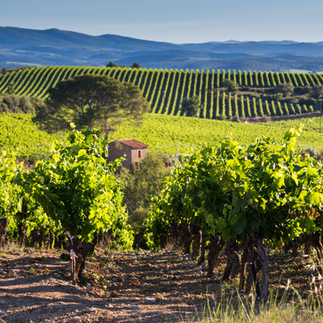Although the Languedoc vignerons have suffered with heat and humidity this summer, we've been much more fortunate than other regions in southern Europe. The temperatures have not exceeded the mid-30s for the most part, which wouldn't be very unusual for this time of year. The humidity (caused by hot but cloudy and overcast days) is an more unusual occurrence for us in July and we had some incidences of oidium and mildew in several vineyards, which will negatively affect the final yields. Happily, the quality overall seems excellent again so far this year - we keep our fingers crossed that our luck continues for the final few weeks before harvest begins.
Nobody can deny that the heatwaves in recent years have been more intense and extended than ever before. In my home country of Ireland, which is suffering a particularly wet July, there are headlines about the severity of the heat in the popular hotspots of Greece, Italy and Spain. The wildfires in Greece have been especially frightening and pose a serious threat to human life. In addition, tens of thousands of hectares of forest and land have been destroyed since the fires began, which is also devastating for the local wildlife.
It's been said that wine is like the canary in the mine, when it comes to climate change, as vines are so sensitive to changes in conditions. The onus is on all all, as wine producers and wine lovers, to protect our industry and ensure its sustainable future by working to reduce our carbon footprint and to protect and safeguard our land for future generations.
Sustainable practices are inherent to what we do at Laurent Miquel. If you believe quality comes from the vineyard, then it makes sense to promote healthy and vibrant soils. However, the awareness of climate change drove us to take further action over the last 25 years. We are HVE level 3 certified, the highest level of certification with stringent environmental requirements. We use no artificial chemicals in the vineyards, carefully manage our use of water, promote biodiversity in our estates and preserve natural hedging and woodland and we have since expanded our ambition by adapting all of our vineyards to the philosophy of regenerative agriculture. We built our lake at Auzines, so that we would have our own water source for drip irrigation during the growing season, something that will become more critical as temperatures rise. Our tanks are clad with insulation to reduce our energy use and we also reduced the average weight of our bottles by 33% - glass production and transport makes up over 50% of CO2 emissions from a winery.
We do all of this because it's the right thing to do for the planet and for our land. As an 8th generation family wine estate, we owe it to the next generation to leave a legacy and a wine tradition that they can take forward with pride.















Comentários